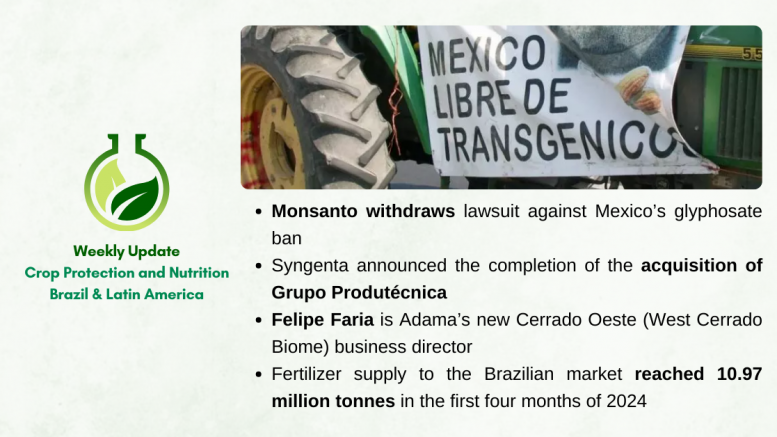Monsanto Withdraws Lawsuit Against Mexico’s Glyphosate Ban
Brazil
The Ministry of Agriculture has shut down an illegal fertilizer and pesticide company in Araraquara, State of São Paulo. The establishment was not registered to manufacture fertilizers and pesticides, in addition to not presenting the required environmental license. All the necessary equipment for the production of agricultural inputs, raw materials, packaging, and labels were found. 17,590 L of liquid fertilizers, 6,225 kg of solid fertilizers, 500 empty packages, and 1,140 L of biological pesticides were also seized. (MAPA)
Felipe Faria is Adama’s new Cerrado Oeste (West Cerrado Biome) business director. (Adama Brasil)
After approval by the Administrative Council for Economic Defense of Brazil, Syngenta announced the completion of the acquisition of Grupo Produtécnica – a distributor of agricultural inputs that operates in the States of Maranhão, Piauí and Tocantins – through its commercial platform, Synap. (Syngenta Crop Protection)
Federal Attorney General’s Office – AGU and Ibama sued Syngenta for alleged adulteration in pesticide formulas. Action filed by AGU in the Federal Court of São Paulo asks for US$ 16.46 million from the company as a future guarantee for repair of damages. (AGU; Ibama)
Syngenta Crop Protection, in response to a legal action filed by the Attorney General’s Office – AGU, presented arguments and evidence guaranteeing the safety and environmental integrity of its ENGEO PLENO product. “Syngenta Crop Protection, faced with the action brought by AGU, presented its arguments to the judge, as well as proof of the non-existence of any type of risk or environmental damage resulting from the situation described. Furthermore, we have demonstrated that the agencies responsible for the evaluation and registration of agricultural pesticides – MAPA, Anvisa, and Ibama itself – recently approved the new formulation of the ENGEO PLENO product, considering the levels of BRONOPOL found in the formulations mentioned in AGU’s legal action”. (Syngenta)
Instituto Água e Terra, from State of Paraná, published Ordinance No. 232, from 06/28/24, which resolves “to define the regular delivery of packages of pesticides and related products, those that are delivered to reception centers, stations and itinerant package reception points, known as reception points”. (Instituto Água e Terra)
Farms went through official inspection after a pregnant woman died from pesticide poisoning on indigenous lands in Dourados and Caarapó, State of Mato Grosso do Sul. The request was made by the Federal Public Ministry and resulted in the seizure of 750 L of expired products, in addition to US$ 180 thousand in fines. (MPF)
Agricultural Defense Agency of the State of Tocantins – Adapec has collected 25 tonnes of empty pesticide packages through an itinerant collection campaign. The packages were returned by approximately 800 farmers. “The action removed used packages from the farms to avoid the contamination of people, animals and the environment, prioritizing sustainable production, as these pesticide packages will be evaluated and can later be recycled, being transformed into pipes, tubes…”, said the president of Adapec, Paulo Lima. (Adapec)
National Association of Inoculant Manufacturers and Importers – Anpii announced its own “rebranding” process. Being now called Anpii Bio – National Association for the Promotion and Innovation of the Biological Industry, it is expanding its operations to cover all biological products used in agriculture. According to the Association, this reflects the growth of Anpii Bio, which went from 8 associates in 2022 to 29 in 2024. (Anpii Bio)
Inspections carried out from July 2nd to 4th by the São Paulo Department of Agriculture and Supply resulted in the seizure of 25,040 citrus seedlings that were being produced and/or sold irregularly in areas of Herculândia and Tupã, State of São Paulo. This initiative aims to stop the spread of greening, a disease that threatens São Paulo’s citrus industry. Valentim Scalon, manager of the State Program for Health in the Production of Propagation Materials, said that the inspection took place in six locations, where it was possible to identify the storage of citrus seedlings in open areas. “The actions will become routine in the areas until production is regularized and irregular trade, frequently found during inspections, stops occurring”. (SAA)
Technical Assistance and Rural Extension Company of the State of Minas Gerais – Emater MG and the Minas Gerais Association of Cotton Farmers – Amipa signed a partnership for research on the use of biological pest control in Minas Gerais. The agreement was signed by the CEO of Emater MG, Otávio Maia, by the president of Amipa, Daniel Bruxel, and by the vice-president of the association, Inácio Urban. “Amipa does very good work regarding the sustainability of cotton crops and has a biofactory (located in Uberlândia, Minas Gerais), where insects are produced, which are natural enemies of the main pests of cotton and other crops. The association sought the assistance of Emater MG to validate the benefits of this technology on cotton farms”, said the technical director of Emater MG, Gelson Soares. (Emater MG; Amipa)
According to Stonex, the appreciation of the US dollar relative to the Brazilian real has slowed down fertilizer purchases, and farmers are waiting for the market to stabilize. On the other hand, the appreciation of the Dollar has helped to support the price of soybeans and prevented a further worsening of the exchange rate between soybean and fertilizers. (StoneX Consulting)
Mosaic is investing in the reuse of ores to increase its operational efficiency. Currently, part of the phosphate removed from the company’s mines is not fully used, which means it is not being transformed into phosphorus for the production of fertilizers. The company’s MIP70 project should receive investments of around US$ 10 million to increase the average metallurgical recovery of its factories from 60% to 70%, reaching 50 thousand tonnes per year. “The expansion of metallurgical use directly reflects the reduction in the volume of waste produced in the factories, and this is connected to the company’s development strategy”, said Mosaic’s Vice President of Operations, Elias Lima. (The Mosaic Company)
Agriculture and Agrarian Reform Commission – CRA held a public hearing on July 3rd to discuss the possible uses of the Kappaphycus alvarezzi seaweed, considered one of many alternatives to mitigate Brazil’s dependence on imported fertilizers. CRA is trying to release an amendment to fund research on the topic. “This seaweed is a potassium accumulator. We need to develop projects to use this potassium, which comes from the sea. Our proposals are aligned with the National Fertilizer Plan”, said David Campos, researcher at Embrapa Soils. (Agência Senado)
140 civil society organizations delivered a joint open letter to the Government’s Tax Reform Working Group, requesting higher taxes on pesticides. The entities propose that pesticides must be included in the Selective Tax, which charges more for items that pose risks to health and the environment, with tax classifications based on the toxicity of each substance. (MPF; Heinrich Böll Foundation)
Fertilizer factory Araucária Nitrogenados S.A., a subsidiary of Petrobras, has re-admitted 214 employees. The workers had been laid off in 2020, when the factory had temporarily halted activities. They were hired again following an agreement proposed by the Public Ministry of Labor, approved by the Superior Labor Court in June. (Petrobras)
Fertilizer supply to the Brazilian market reached 10.97 million tonnes in the first four months of 2024, an increase of 1% when compared to the same period of last year. In April, the supply totaled 2.30 million tonnes, 0.6% less than in April of 2023. Mato Grosso was the State with the most fertilizers sold in the country, with a volume of 2.46 million tonnes in the first four months of 2024, or 22.4% of the total, followed by Paraná (1.38 million), São Paulo (1.32 million), Minas Gerais (1.12 million), Goiás (1.06 million). (ANDA)
Unigel has resorted to arbitration by the International Chamber of Commerce to resolve issues relating to the price of natural gas in the contract it signed with Petrobrás. When the lease agreement for the fertilizer factories in the States of Bahia and Sergipe was signed, Petrobrás and Unigel also signed a gas supply contract for 10 years. Despite being separate agreements, the gas supply contract occurred as a result of the lease agreement. (Unigel)
The Ministry of Agriculture has published a list of pesticide registration requests, with 95 products. Companies request the registration of 33 fungicides, 27 insecticides, 32 herbicides, etc. (MAPA)
Rampazzo Distribuidora’s agricultural pesticide warehouse caught fire in Itaí, State of São Paulo. According to the firefighters, it was possible to prevent the spread of the fire, and approximately 90% of the stored products were preserved. (Itaí Fire Department)
Civil Police has carried out 34 search and seizure warrants in 20 cities in the State of Rio Grande do Sul. The action is part of an operation which investigates more than 30 people and two companies involved in a scheme to sell counterfeit pesticides. Pesticides were seized, in addition to 17.8 thousand L of fertilizers, and it was found that one of the inspected companies had been operating irregularly for almost six years. It is estimated that the sales of the illegal pesticides have exceeded a volume of 1.1 million L, reaching approximately US$ 18.45 million. (Civil Police of Rio Grande do Sul)
Kynetec, after publishing a survey on the sorghum seed market, announced research about the sorghum crop protection market. The research will investigate the use of agricultural pesticides by farmers. Data collection began in May and will end in August, with results scheduled for September. According to analyst Felipe Abelha, the research is motivated by the rapid growth of sorghum farming in Brazil. Abelha highlights that the sorghum seed market grew from US$ 53.34 million in 2022 to US$ 65.89 million in 2023, an increase of 23%, and that there has been a 100% growth in seed sales in the last 3 years. “The cultivated area is expanding rapidly. It grew approximately 30% from 2021 to 2023. The expectation for the 2024 season is that it will reach 1.56 million hectares”. (Kynetec Brasil)
The Ministry of Agriculture has published the results of Public Call No. 01/2024, of 05/25/2024, for the “Appointment of Representatives of Entities in the Pesticides Registration Sector for Participation in Tests of the Unified Electronic Information, Petition and Assessment System – Sispa”. Eight representatives were nominated to participate in the online tests. (MAPA)
According to Flavio Hirata, partner at the consulting firm AllierBrasil, the number of registrations of generic pesticides (formulated products based on equivalency) that were the subject of lawsuits against Anvisa, was 9.4% higher in 2023 when compared to 2022, according to the General Toxicology Management’s approvals published in the Official Gazette of Brazil. (AllierBrasil)

Latin America
In Argentina, farmers in the Misiones region request changes to the Bioinputs Promotion Law. Among other regulations, article 7 of the Law prohibited the use of glyphosate in the province, granting two years for the gradual elimination of the product. The Law was enacted in 2023, and the deadline expires in July of 2025, and farmers say they fear for the future of their crops. The Federation of Rural and Forestry Associations of Misiones and the Argentine Rural Confederation have demanded the repeal of the law. (CRA; FARM)
Monsanto drops its lawsuit against the decree that prohibits the use of glyphosate and GMO corn for human consumption in Mexico, according to the National Council of Humanities, Sciences and Technology – Conahcyt, which guaranteed that it “will continue to advance in compliance with the decree, in full coordination with the other instances of the Federal Public Administration, until GMO corn and glyphosate are removed from the diet of Mexican families”. (Conahcyt)
Bolivia and Brazil have signed six agreements, regarding power-generation, mining, fertilizers and industrialization, after a meeting between the presidents of the two countries. Three memorandums of understanding, one addendum, and two letters of intent were signed. Cooperation was announced for the industrialization and commercialization of fertilizers and sodium chloride. Furthermore, the Government of Brazil has committed to making more purchases of Bolivian gas. (Government of Bolivia)

READ MORE:

